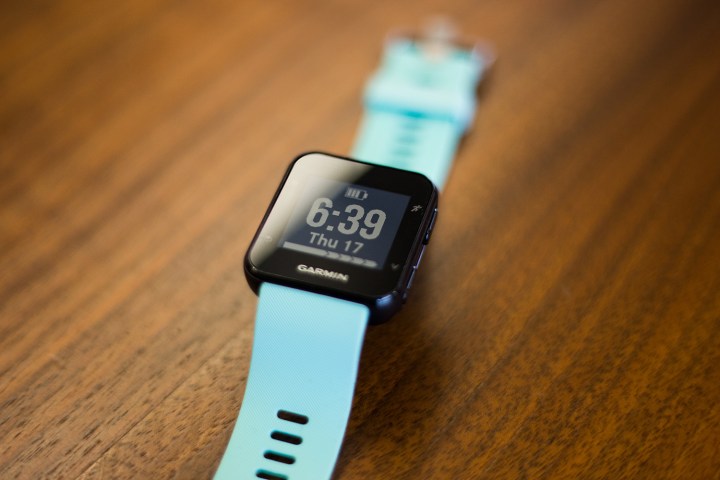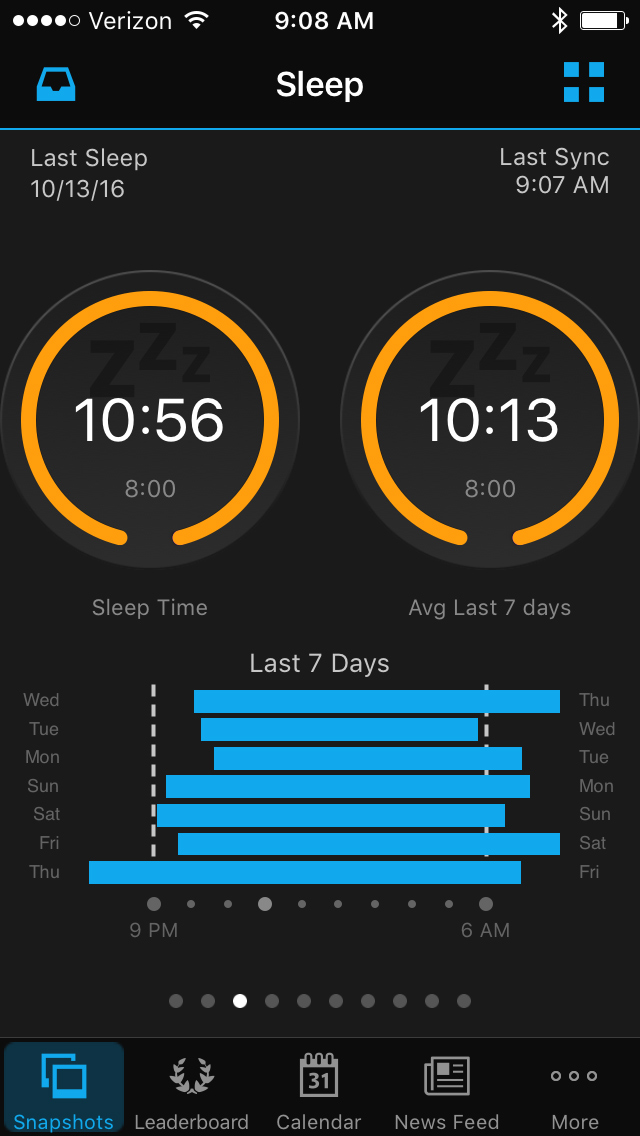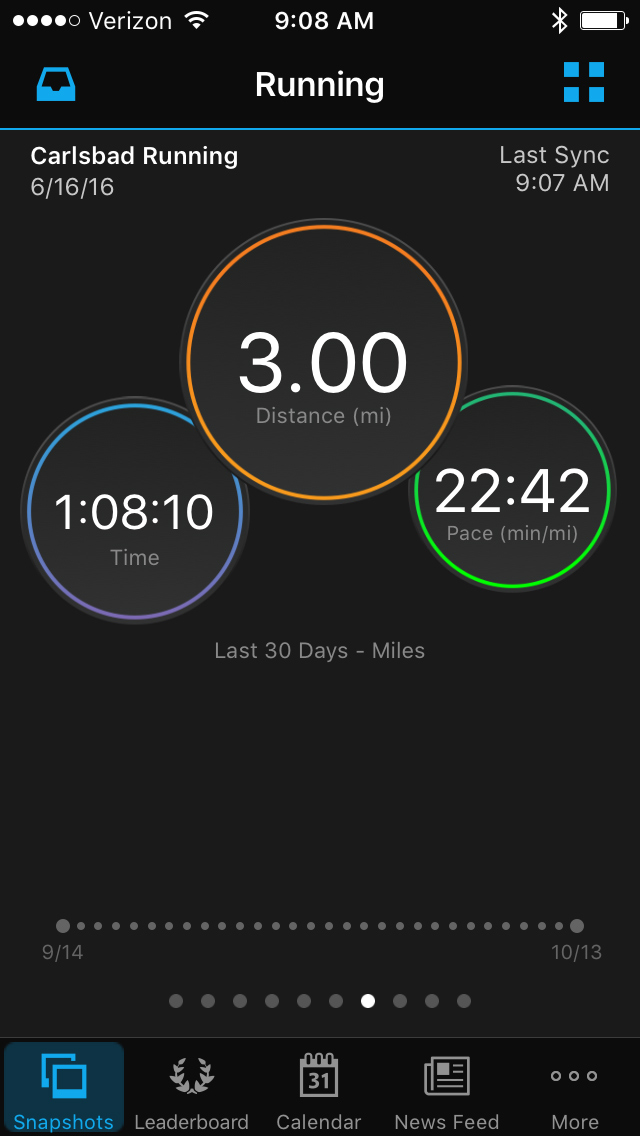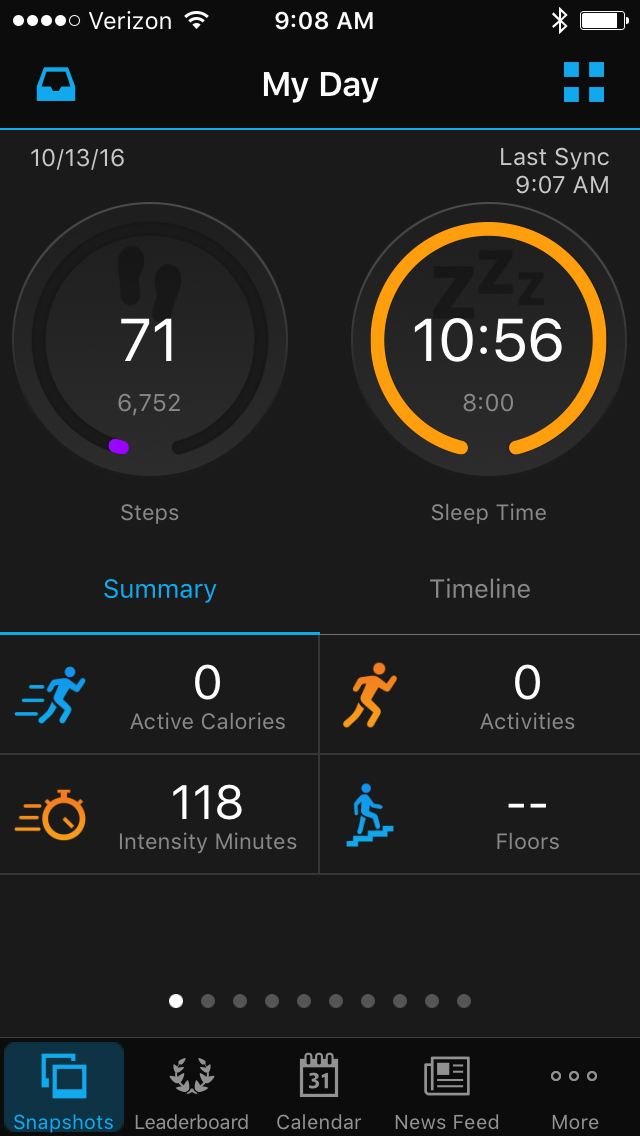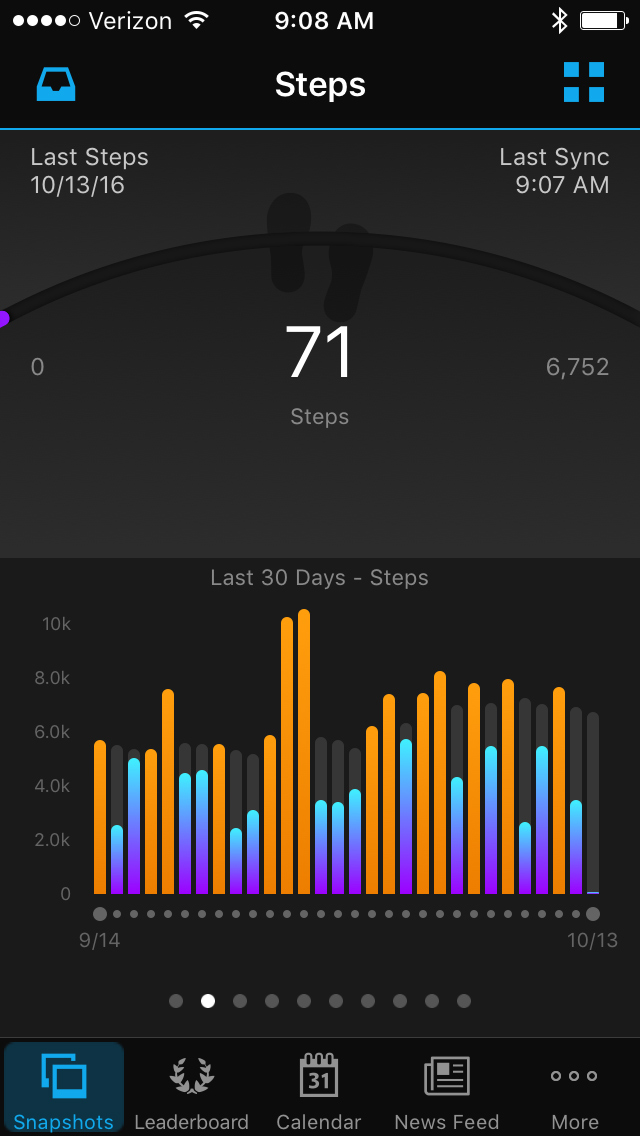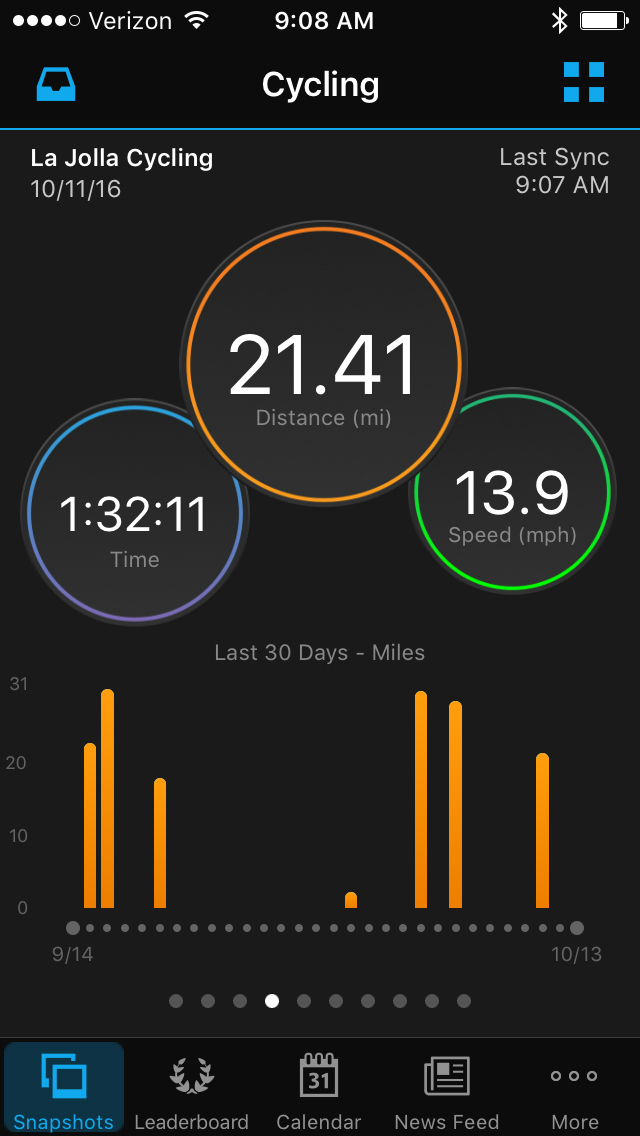“The Forerunner 35 is a lightweight, attractive, water-resistant smartwatch that is near-perfect for runners.”
- Lightweight
- Stylish design
- Smart Notifications
- Vibration alarms
- Waterproof
- Only one scroll button
Each time Garmin introduces a new fitness smartwatch it gets more right, especially with GPS running watches. The Forerunner 35 is no exception. Garmin’s Forerunner line currently includes six different watches from the entry level 25 to the track-everything 735XT multisport watch. The 35 is the newest member of Garmin’s Forerunner family and it is the most attractive, affordable heart rate monitoring GPS running watch the company has ever made.
Features and design
The Garmin Forerunner 35 is a sassy little Chiclet of a watch not much different in size and shape from the small Apple Watch. Its round-cornered, rectangular face measures 1.5 x 1.6 inches and it is half an inch thick. The display is a monochrome LCD with a resolution of 128 x 128. The main screen shows the battery charge level, Bluetooth connection notification, the time, and the day and date. Below the date is the Garmin move bar that displays how long it’s been since you last moved. The FR35 is light, weighing just 1.3 ounces (silicone band included). The band, which is replaceable, comes in four fashion colors: black, limelight, frost blue, and white.
Inside the water-resistant case (good to 5 ATMs) Garmin has included an accelerometer for counting steps and automatically noting activities, a GPS unit for precise distance, speed, and route tracking, and a built-in optical heart rate monitor for tracking performance and measuring a more accurate calorie burn. With this tech the FR35 can track indoor and outdoor running, walking, cycling, and cardio workouts. The watch also records heart rate 24 hours a day. Because the Forerunner 35 is ANT+ compatible it can be paired with optional heart rate straps and speed/cadence cycling sensors. When paired with a compatible smartphone, the Forerunner 35 delivers full smart notifications including texts, emails, and any other alerts the phone is set to deliver. The watch is not, however, compatible with Garmin’s Connect IQ app environment which means there is no customizing the watch faces or adding different tracking apps to the mix.
Runners can set up training guidance alerts based on heart rates, paces, or speeds targets and the FR35 will vibrate and/or sound a tone to let the wearer know they’re getting out of range. With simple on-the-watch programmable settings, the watch can be set for distance- or time-based interval training, including customized warm-up and cool downs.
Interacting with the Forerunner 35 is done through four buttons, two on each side of the watch’s case. The buttons are recessed into the case keeping them from sticking out too far. The button at the upper left operates the backlight, the lower left functions as a back button or, with a long press, the menu button. On the right side, the top button starts and stops activities and is used for selecting items in the menu. The lower right button is the scroll button for the menus, data screens, and texts or smartphone notifications. A long press brings up the music controls of a connected smartphone.
What’s in the box
The Forerunner 35 what we tested arrived with the watch and frost blue band, a USB charging clip/cable, and a quickstart guide.
Performance and use
One of the nice things about the Forerunner 35 is that it is possible to get the watch running without connecting it to a computer or pairing it with a smartphone. Pressing the top left side button turns the watch on and a long press on the lower left button brings up the menu that allows access to the settings. From there personal info like height, weight, age, gender, and max heart rate can be entered and the time can be manually set.
The Forerunner 35 was so light it was like putting on nothing at all.
While setting the watch up using only buttons is possible, the smoothest way to get started is by downloading the free Garmin Connect smartphone app and creating an account. Once the app is running, pairing the new Forerunner 35 device requires clicking the “more” button at the bottom right of the screen then scrolling down and selecting “Garmin Devices,” then tapping the blue bar near the bottom of the screen where “Add Device” is displayed. On the next screen the app displays a list of all Garmin devices. Click on the Forerunner 35 and then follow the directions. Thankfully, all Garmin smart devices use the same free Connect smartphone app so those who already have an account will find it simple to set-up the watch.
When we first slipped the Forerunner 35 on it was so light it was like putting on nothing at all. After weeks of testing big, burly, do-it-all GPS watches it was a pleasant surprise to strap on a watch that didn’t drag our wrist down. The lightweight comfort of the watch made us feel like we’d been freed from the restraints of wearing a watch at all. And running with it was equally liberating.
Running with the Forerunner
To start a run we clicked the upper right button, then used the down scroll button to choose “run outdoor.” Press the upper right button again and the Forerunner 35 begins searching for the GPS satellites. After 10-15 seconds it was ready to track and we pressed the upper right button again to start the activity. The outdoor running tracker comes stock with two different data screens, one includes distance, time, pace, and the other displays heart rate zone, heart rate, and calories burned. These data fields can be easily edited and switched around on the watch or by using the Garmin Connect app (iOS | Android). If two data screen aren’t enough, two more can be added to the Forerunner 35 for a total of four screens per activity. The watch alerts a lap every mile and shows the lap time. When the run was completed we pressed the upper right button again, then used the lower right to scroll to save the run, and then pressed the upper right button a final time to save the run.
Operating the watch is very straightforward. The only trouble we had with the data fields was while we were tracking a walk. The walk data fields were set to show distance, timer, and average speed, however, each time we tracked a walk the timer showed the time of the current lap rather than total activity time. We tried several times to switch this up, but nothing we tried worked. Another issue we had was that there is no way to insert “time of day” as one of the data fields. When we were in an activity, the only way to check the time was to use the down scroll button and click it three or four times through the other data fields to get back to the main display. It was not a big problem, but it would be nicer to have the options of time as a data field.
While scrolling through the data fields we also realized the downside of having only one scroll button. Without an up scroll we often clicked right past the item we were trying to get to and had to go all the way through the menu screens again. Again, not a huge problem, but we did occasionally find it a bit annoying.
The FR35’s find my phone function works great.
The music control functions on the Forerunner 35 were a dream. We’ve used this function on many watches that we’ve tested, but with the four button layout and no touch screen to mess with, this was the first time that we’ve had a watch that made controlling our phone with the watch easier than getting the phone out. The music controls come up with a long press on the lower right button and then that button because the play/pause button with the upper left and right buttons working and forward and back in the playlist. Done and done.
Finally, there is the find my phone function. We’ve always thought it a bit of a parlor trick until we needed to find our phone. We roll most of the time with our phone ringer off (and trust a Garmin watch to vibrate when we get calls). When we misplace our phone we can’t just call it. The FR35’s find my phone function works great. Hold the button down and the phone will begin screaming out from where ever it has been hidden making it much easier to find.
While the FR35 does a great job tracking running, walking, and cycling (and controlling music), it is good to remember (and trust us we kept forgetting) that the watch does not track swimming. We wanted it to track swimming so much. It’s not fair to expect more out of a watch than what the manufacturer provides, but we liked the size, design, and format of the watch so much that we wished Garmin had squeezed just a little more tech in there, because if the Forerunner 35 could track swimming (and maybe snowboarding and stand-up paddling) it would be our everyday watch.
Our Take
The Forerunner 35 is a great, light, attractive, water resistant smartwatch that looks as good as it functions. We liked the smart notifications on this watch so much that we’d suggest the Forerunner 35 to anyone looking for a smartwatch regardless of their interest in fitness.
Is there a better alternative?
For pure runners the Forerunner 35 is near perfect. The watch is light, stylish, and feels great on the wrist while offering all the run tracking, interval training, and heart rate monitoring that any runner would need. The fact that it also tracks cycling and can connect to ANT+ cadence sensors and heart rate monitoring chest straps make it a great watch for cyclists as well. And, the way it handles smart notifications makes it a hard watch to take off.
How long will it last?
Over the past few years Garmin has been diligent about upgrading the software on their GPS watches each and every time they have a fix. There is no reason to believe the same won’t happen with the Forerunner 35. The fact that it is a new shape and design suggests that it will stay in the line for a while and be upgraded often. It might even get some new functionality in the near future.
Should you buy it?
Yes.. For serious runners and cyclists the Forerunner 35 is the most capable, compact GPS watch we’ve reviewed and anyone looking for an affordable way to get their rides and runs into Strava should be more than pleased with it. Sadly, the swimmers are out of luck. While the Forerunner 35 does perfectly fine in the water for telling the time, it won’t track either pool or open water swimming. The only Forerunner that can track that is the top of the line 735XT and it costs more than twice as much.


